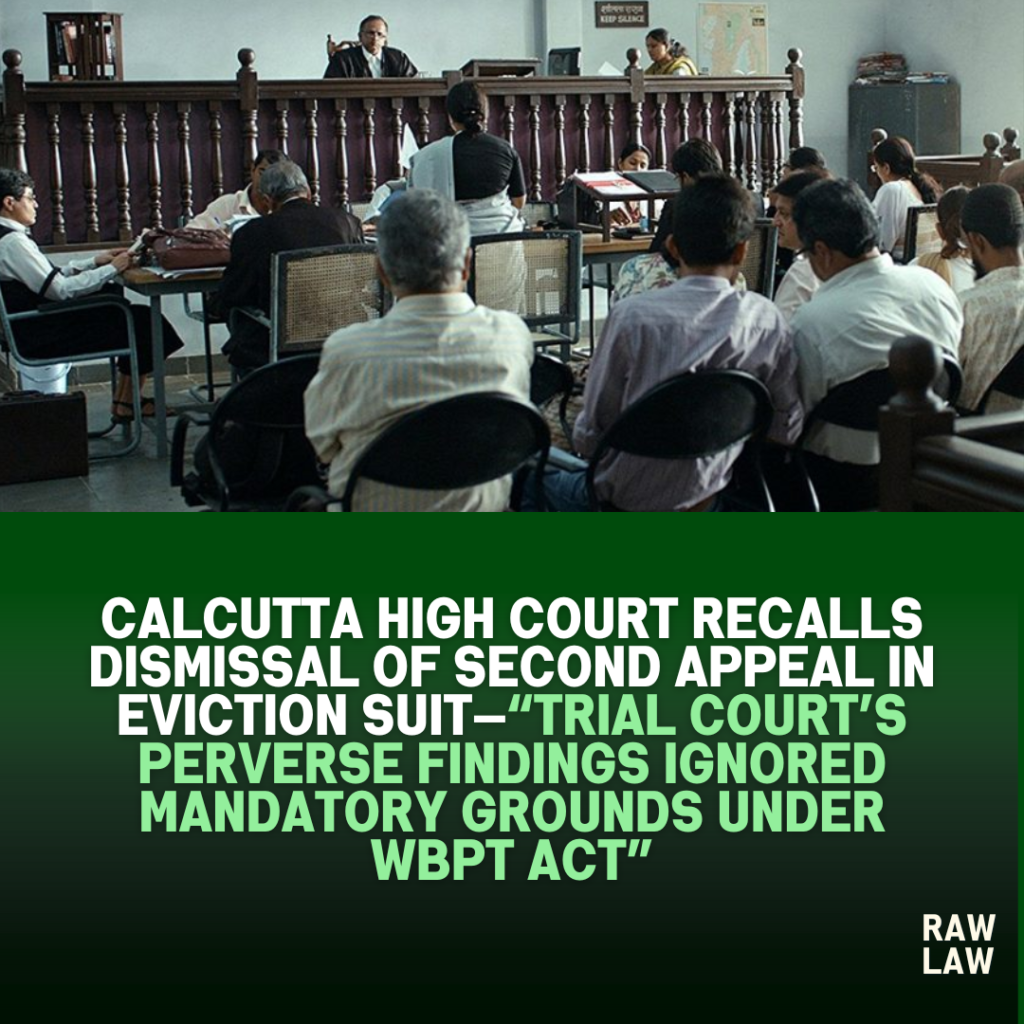Court’s Decision
In RVW 263 of 2023 in SA 246 of 2010, the Calcutta High Court, per Justice Dr. Ajoy Kumar Mukherjee, allowed the review petition by recalling the portion of its judgment dated 26.09.2023 that had dismissed the second appeal. The Court remanded the matter to the Trial Court under Order XLI Rule 25 CPC for fresh findings on three specific issues under Section 13(1) of the West Bengal Premises Tenancy Act, 1956 (WBPT Act).
“This is a fit case to remand because it is clear that the trial court has omitted/failed to determine the question of fact as well as question of law as to whether plaintiff has succeeded in proving any of the grounds mentioned in section 13(1) of WBPT Act, 1956 or not.”
Facts
The respondent/landlord filed a suit for eviction of the tenant under T.S. No. 64 of 2005, on the grounds of default in payment of rent, reasonable requirement, and building/rebuilding. Eviction notices dated 12.10.1999 and 11.02.2000 were served, but they did not mention Section 106 of the Transfer of Property Act. The Trial Court decreed eviction, holding the defendant a defaulter based on admitted non-payment of rent from June to November 1999. However, it refused to consider the rent control challans submitted by the tenant on the presumption that the WBPT Act was inapplicable since the suit premises were in a panchayat area.
Issues
- Whether the eviction decree was sustainable despite non-consideration of rent control challans.
Whether the WBPT Act, 1956 applied to the suit premises at the time of filing. - Whether the eviction suit required compliance with Section 13(1) of the WBPT Act, 1956.
- Whether the earlier appellate and second appellate findings were legally valid.
Petitioner’s Arguments
The petitioner contended that the Trial Court erred in ignoring the rent control challans (Exhibit-B series) without any legal justification and wrongly assumed the applicability of the Transfer of Property Act. It was further argued that the eviction grounds under Section 13(1) of the WBPT Act were neither framed as issues nor proved, making the eviction decree legally unsustainable. The review was sought on the ground that the High Court’s earlier judgment had dismissed the second appeal wholesale without directing remand, despite procedural lapses by the Trial Court.
Respondent’s Arguments
The respondent argued that the eviction notice was duly served and that non-payment of rent was admitted. It was further contended that with the Presidential assent to the WBPT Act, 1997 in 1998, the earlier Act of 1956 stood repealed before the institution of the suit in 2000, rendering the TP Act applicable and relieving the landlord from proving specific grounds under Section 13(1).
Analysis of the Law
The Court clarified that mere assent to a statute does not amount to its enforcement. The WBPT Act, 1997 was notified only on 9th July 2001. Hence, until then, the WBPT Act, 1956 continued to operate. The Court found that by notification dated 12.05.1989 (No. 245 LR), the 1956 Act was extended to the area in question—Pandua Mouza—and thus was applicable when the suit was filed in April 2000.
Precedent Analysis
While the judgment does not explicitly cite prior case law, the reasoning is rooted in established principles of statutory interpretation:
- A statute becomes enforceable only upon publication in the Official Gazette, not merely upon Presidential assent.
- Section 13(1) of the WBPT Act, 1956 is mandatory and has overriding effect (“non obstante clause”).
- A decree of eviction not based on statutory grounds amounts to nullity.
The Court emphasized the protective nature of tenancy law and the need for strict compliance with statutory requirements before evicting tenants.
Court’s Reasoning
The Court held that:
- The Trial Court wrongly disregarded evidence (rent challans) based on an erroneous belief about the governing law.
- The First Appellate Court repeated the same error and held that the WBPT Act, 1956 was repealed in 1998 due to the 1997 Act’s assent.
- The second appellate judgment (dated 26.09.2023) erred in dismissing the entire appeal despite finding legal flaws in the lower court judgments.
The Court framed the following three issues for fresh determination by the Trial Court under Order XLI Rule 25 CPC:
- Whether the defendant is a defaulter in payment of rent?
- Whether the premises are reasonably required for the landlord’s personal use and occupation?
- Whether the premises are needed for building/rebuilding or substantial alteration?
Conclusion
The review was allowed. The High Court recalled the portion of its earlier order dismissing the second appeal and remanded the case to the Trial Court to record findings on the three framed issues. The Trial Court is to complete the process within six months.
“Even a compromise decree must contain materials to indicate that the decree is passed on any of the grounds mentioned in statute, otherwise decree will be of nullity.”
Implications
This ruling strengthens procedural safeguards for tenants under the WBPT Act and ensures that no eviction decree can be passed without strictly complying with the statutory requirements. It reiterates the principle that laws protecting tenants must be interpreted strictly, especially when the trial courts disregard key evidence or misapply statutory provisions.
Summary of Referred Notification
Notification No. 245 L.R. dated 12.05.1989
Extended the application of the WBPT Act, 1956 to Pandua Gram Panchayat, thereby making the Act applicable to the suit premises. This was wrongly ignored by the lower courts.



